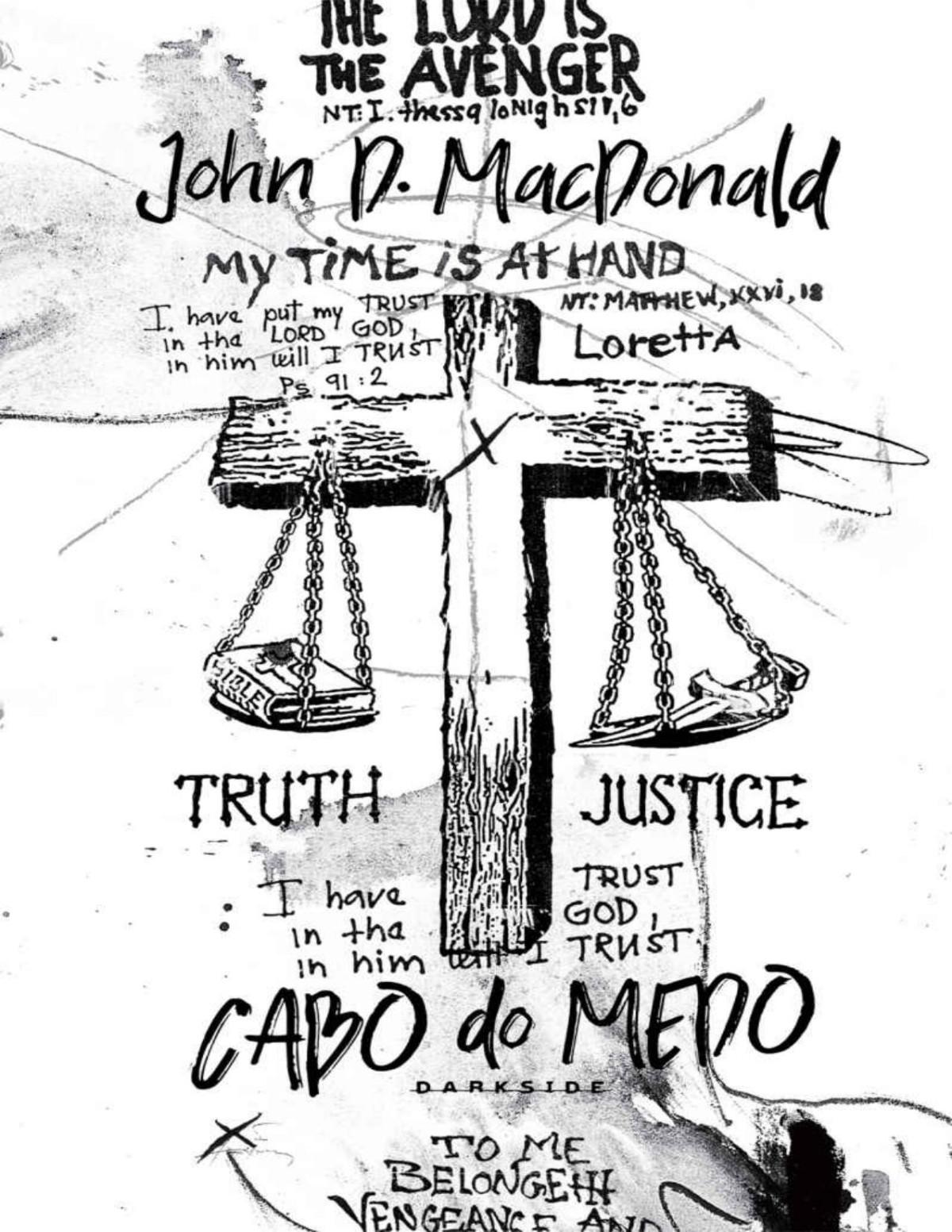JudgeMe Not
l,y John D. MacDonald
Copyright 1951 by
John D. MacDonald
All rights reserved, including the right to reproduce this book or portions thereof.
All characters in this book are fictional and any resemblance to persons living or dead is purely coincidental.
Printed in the United States of America
Chapter One
WHENTHE WOMAN left his side he turned, in his sleep, toward the window.
The late October sun slanted across West Canada Lake, rebounded· from the locked shutters of the other camps, shone with faint warmth through the open window of Teed Morrow's rented camp, shone red through his closed eyelids as he let himself drift slowly up from a nap of pure relaxation. He lay naked on the red and blue Indian blanket, a rangy, deep-chested man, with muscles laced tightly to the angular bones. The brown hair on his arms and legs was bleached lighter than his summer tan. He yawned and sat up slowly, stretching his left arm until the shoulder popped, scratching his chest with the knuckles of his right hand. His features were heavy, and his eyes were chronically sleepy, and his hair was a tight cap of brown-blond wire, thinning just a bit on top.
He squinted appreciatively across the lake at the fading fire-colors of autumn on the slopes of the Adirondack hills, and felt sad that this was nearly the last of the week ends before the camp was taken over by winter.
The distant hiss of the shower stopped and the water. pump chugged on for a few minutes before it stopped too. He flipped a mental coin and decided on a swim. His trunks were still beside the bed where he had dropped them. As he stood up to pull them on he noticed how neatly the mayor's wife had arranged her clothes on the cane-bottomed chair at the foot of the bed. Nubby fall suit, with coat fitted over the back of the chair, skirt folded neatly. High-heeled alligator pumps standing side by side, an inch from the hanging toes of the empty nylons.
A very neat woman. Very careful. Very calmly and carefully sensuous, a quality making this little affair quite safe while at the same time robbing it of the spice which recklessness would have sharpened.
The door of the tiny bathroom swung open and she came out with her faintly, intriguingly knock-kneed walk.
JUDGE ME NOT
She had her head lowered so that the dark hair, damp from the shower, had fallen forward over one eye. She was biting her underlip and her arms were craned up behind her, fastening the bra. Her breasts were small, her hips tautly narrow, the sheer whiteness of the bra and panties startling against the almost mahogany tan.
"There," she said. She tossed her head, flinging the dark hair back, standing smiling at him with measured warmth, with only a trace of consciousness of self.
He knew that her pride was in her girl's body, in her unsagging tautness, in nut browness that the years---she would not tell him how many, though he guessed thirtyfour-had not touched, and so he always felt a strong obligation to make a small salute in the general direction of that pride.
He shook his bead, clucking. "Not over seventeen, miss."
"Great fool! What woke you up? I was going to sneak out."
"Sun in my eyes. And you floundering and splashing around in there."
She picked up shoes and nylons and sat on the edge of the bed. She pulled the stockings on, her face intent on this small task, and he stood and watched her, trying to gauge within himself the extent of renewed desire, because this was the measure of how long this thing would last. And, instead of desire, he saw a meagerness about her body. In her face there was a touch of something simian.
Felice slipped the pumps on, stood up and walked away from the bed and looked down and backward around her hips, curving her shoulder out of the way. "Seams straight, Teed?"
"Straight. Say, how about your hair?"
"You mean wet? I'll leave the top down. It'll be dry by the time I get back to Deron."
She took her purse off the high bureau, turned and smiled at him. "If you're going to kiss me, better do it before I get my face on."
He tilted her chin up, kissed her lightly, quickly.
"And is that all?" she pouted.
"For the nonce, l\frs. Carboy."
He sat on the bed and watched her apply the careful make-up, then don blouse, skirt, tailored jacket. She had brushed her hair into shape. The last thing she did was take a pair of tinted glas�s with heavy dark frames and put
themon.Itwasthelasttouch whichalways seemed to tum her into a reasonably prosperous librarian. She looked at her watch."Lotsoftime."
Shesat beside him on the bed.He took her purse, dug out two cigarettes, handed her one. She detested having hercigarettes lit for her, then handed to her.
He struck the match. He lit hers and then, as he was lighting his own, she said, "What do you think of me, Teed?"
"Ithink you're the poor man's chameleon.Twenty minutesafteryouleapoutofbed, youlookready tobespeaker at the luncheon club. Unflattering, I call it."
"Teed! I don't mean that way. I mean when you met me." Sheswung a crossed leg and pouted.
"Let me see.That was in hizzoner's office. There I was, acleanyoungcivil servant, looking lustfully at the mayor's wife."
"Be serious, Teed."
"0.K., so I saw a gleam in your eye."
"Other men haven't seen it."
"Oh, I'malwaysalertfora gleamlikethat.And frankly, hizzonerdidn't strike measthesortof oldparty who could do very much about that gleam.''
She gave him a cool look."So the perceptiveTeed Morrow decided then and there that I was a loose woman. Now who's unflattering?"
"No. Not then and there. That was just a preliminary survey. I rechecked it that night I bummed a ride home withyouafter thelate work."
"RecheckedI" shesaidscornfully."Masterfultype, aren't you?The subtle approach. Fat chance I had to say yes, no, or maybe."
"Peoplesayno to hesitantpeoplejustbecause they think they should."
She looked down and drew crosses on the back of his handwith apointedfingernail. From his angle of vision he couldlook intothe curveofherthroat, seethe slowbeatof a visible pulse.
"What's the matter with me, Teed?" she asked softly. "I ought to feel rotten, all the way through.And my conscience doesn't hurt a bit. Ijust don'twant to be caught, andthat's all I care."
"What are you working up to, Felice?"
Shelifted her eyes slowly to his.Her lipswere not far
JUDGE ME NOT
from his. Her mouth trembled, and he felt almost certain that she had made it tremble.
"Would I betooterriblysilly if Isortof.•• kidmyself, Teed?"
"In what way?
"Well ...thinking that• . . doing this with you might help Mark."
Hestared atherand wanted to laugh. "Now wait a minute, Felice! Let's get back on whereI fell off.Item-Mark Carboy is the mayor, and your husband. Item-MarkCarboy is a slightly stupid man, a figurehead for the Raval mob.Item-my boss, Powell Dennison, is the new city managerwhoisveryfranklyouttotakethecityawayfrom Raval.What am I supposed to do?Go up to Powell and say, 'Please, Mr.Dennison, you got to take it easy onCarboy because I'm sleeping withMrs.Carboy? "
She winced."Damn you, do you have to say it that way?
"Then tell me what you mean."
She shrugged."Everybody calls you Dennison's hatchet man, ever since he sent for you six months ago.If you wanted to help Mark, you could find a way."
"If I wanted to."
She looked down again and ran her fingertips up the back of his wrist."l>o you want to take my silly little rationalization away fromme, darling?"
"And if I did?"
"I just really don'tseehow I could ... let myself goon with this. I mean I love you and need you so dreadfully and all that, but ..."
"You'd like to think you were really doing it for Mark, eh?"
She didn't look up."Don't be cruel to me, Teed."
"I suppose you want me to promise."
"Oh, yes, Teed. Just a little promise.And it won'thurt anybody. Mark isn't dangerous." He saw her mouth twist. "He's just a fool."
He felt remote, apart from the twofigures sitting on the bed, almost as though he were a third person-judicious, objective, slightly scornful.No matter how soulfully they could manage to look at each other, no matter how suggestively her fingertips nibbled at his arm, it was still a tired little scene that did neither of them any particular credit.He wondered if his sudden desire to humiliate her
arose simply from a feeling of rewlsion at this trade she wanted to make.
"That's something I ought to think over. "
She gave him a wide-eyed stare."Think?For heaven's sake, why?"
"Ishouldpromise, eh?Likethat.Becauseyouaskmeto.
"No. Because I mean something to you, Teed."
"Sure you do, kitten. You mean a lot to me. "
She took off the heavy-rimmed glasses, leaned back, bracing herself with her arms, looking at him with a shy, inviting smile.
"Itisn'treally aslateasI thought, Teed," shesaid."Tell me what I mean to you."
"A near miss, Felice."
She stiffened. "What does that mean?"
"Allalongit'sbeenagoodtry. Butyourlove-making, my sweet, has been under very precise control.Your little frenzies have been so very exact. Like you have an outline in the back of your mind, a sort of picture ofFelice enjoying herself, and you follow it right down to the last semicolon. "
For a few moments her face was utterly expressionless. He felt as though he could actually hear the tiny click as the decision dropped into place in her mind.She pivoted suddenly, kicking her feet up, falling back across his lap, looking up at him.
"Ofcourse it was that way, Teed, shesaid."Butnowit will be better. I didn't realize I had that ...reserve.Now you'veexplainedittome.NowthatI know you'll helpsilly old Mark, the ...last barriers can drop, Teed.The very last. I'll be the most perfectly wanton thing.Hold me, Teed. Hold me tight. Maybe now I can really completely forget myself. Please, Teed. "
No, baby, he thought.You've never forgotten yourself and you never will. You are a trim, tight, controlled little package, and in your little blindnesses and incoherences, your little love-cries, you've been reading your lines off a script in the back of your mind.I've heardthe pages rattle as you turned them.
He let her wait.He made no move.Something quite close tohate stirred behind her eyes, even as she was making them heavy-lidded. He could sense her surprise that he did not plead for a continuance of this timetabled, doublespaced, rigorously outlined affair in which each posturing,
JUDGE
ME NOT
each body juxtaposition had been as curiously impersonal as the complex figures of an ancient dance with stem rules and forgotten significances. Her little excitements had been doled out by the cc., and her rapt functions had been performed with the practiced economy and elegance of the expert.
He was a little surprised at the relief he felt that it was now over, as though the shame had come, not from the necessary subterfuges of adultery, but from a sense of misdirected functioning, as though he were an adolescent now giving up forbidden solitary experimentations.
So he shook his head sadly and said, "All for Mark, eh? My lamb, the merchandise is attractive, but the markup is too high."
He caught her wrist when her curved nails were inches from his eyes. She tore herself free. He sat placidly and watched her pace in restless anger.
"A truly astonishing vocabulary," he said mildly.
She suddenly fought for control, achieved it quickly. "All right, Teed. I'll mark it up as a waste of effort." She gave her flashing simian grin, and he liked her for it. "An enjoyable waste, but a waste."
"I could ease the blow a little for Mark, but what's the point? He's in deep. People generally pay for their deeds."
"Aren't you a little righteous, Teed?''
"That business about pots and kettles isn't written into the statutes yet. We are going to have to see each other around town, Felice. Let's not end it on too bad a note. Would it look too silly if we shook hands?"
"Like the old joke about the monkeys? It would be silly, but there's no one here but us chickens." She walked over to him as be stood up. He had always liked her walk. A taut, brisk little walk, feet coming down firmly. It called attention to the cleverness of assembly of the joints and tendons of ankle, knee, and hip. He handed her the glasses and she put them on, put on at the same time the little earnestness that went with the glasses, a social-worker, Wellesley-graduate, only-the-best-books earnestness.
She shook hands a bit uncertainly, like an actress who discovers that the last sheet of her radio script is unaccountably missing.
There was nothing to gather up, for in all previous visits to the camp she had left nothing. She took her purse and they walked out to· the slightly shabby convertible
JUDGE HE NOT 11
which was the second car of the honorable Carboy family.
"I shall never forget you, Teed," she said seriously. "Take it easy on the way back. The roads are tricky at dusk, Felice."
"You won't ever ... oh, hint or anything to anybody?"
For one moment her mask of precision and calmness slipped, and there was something naked and afraid in her eyes. She sat behind the wheel, jacket unbuttoned. And looking at her, he knew how he had missed in the beginning, how he had never thought of the very obvious device of extreme roughness, of hands careless of the softness of her. And in the moment of ending all of it, he knew it was possible to begin it again, and on a different and better basis.
So he patted her shoulder very lightly and said, "Take care, honey," then stood and watched the car bounce on the ruts of the short lane, turn sharply onto the highway. The motor drone faded away down the two-lane asphalt that half circled the lake.
Teed wandered back into the camp, oddly restless. There was little left of her. A towel, still steamy, on the shower rail. Four cigarette butts, red-smeared, in the flat brass tray. Two long black hairs caught in his brush. An indentation in the pillow where she had napped. He hung the towel out on the line, emptied the ash tray into the chunk stove, fluffed out the pmow. He pulled the hairs from the white bristles of the brush and, remembering a childhood trick, held them tightly as he ran thumb and fingernail down the length of them. They sprang into black, tight-coiled springs, and that was supposed to mean that you were healthy.
The last of the sun was gone when he walked down to the dock. He went off in a flat dive, came up snorting, lifting his arms in a slow powerful crawl. A hundred yards offshore he rolled onto his back and floated, thought about Felice. She probably loved Mark Carboy, the fumbling old fool. Felice was a second wife. The children of the first marriage were grown, living far away. There was prestige in being the wife of the mayor. Even, under the brand-new City Manager Plan, a figurehead mayor. But Felice hadn't saved him, couldn't save him. Teed Morrow felt a hard excitement as he thought of how he and Powell Dennison were going to break the city of Deron wide open.
JUDGE ME NOT
PowellDennisonhad been hisfar11lty advisorwhenTeed had majored in political science. There had been mutual respect, friendship.Then during the occupation years, ColonelDennison had wangled a transfer ofCaptain Morrow to hisAMG command inGermany.Together they had broken the hold oftheex-Nazis, given thepeoplea measure of trust and faith and hope, set up a town that later became a model for all military government in the western zone.
Andafter five yearsofinfrequentcorrespondence, Powell Dennison had sent for him again, brought him to upstate NewYork from ajob as director of a taxpayers' research bureau in.western Pennsylvania, crammed his appointment as Assistant to theCity Manager down the throats of the CommonCouncil.
"This," said PowellDennison, "is going to be atoughy. That's the way you like them, Teed, isn't it?"
"With minor reservations. "
"Two hundred thousand people here. A slick little bastard named Raval has been city boss since before he was oldenough to vote.Not only does he wax fat on the horseroom take, whorehouse row, kickbacks from cops and firemen, punchboards, slots, dope .. .infact, the whole usual line of racketeer arrangements, but he owns the city government, lock, stock, and barrel.His companies bid against each other for the privilege of paving the streets, building the schools, diggingthe sewers. On the surface it looks like atwo-partysystem, but actuallynobodygetsintoofficewho isn't willing to play ball with Lonnie Raval.His goons control the wards which swing the balance of power one way or the other.There was a big yen for reform last year among the better citizens.So Lonnie threw them a bone. He let this City Manager thing go through.He figured he could handle anybody who landed on the hot spot. That means me. I am going to be a serioussurprise to Mr. Lonnie Raval."
"Sounds like fun."
"More than that, Teed.It's dangerous.Lonnie Raval is tied in with the eastern syndicate.He can import his hard boys when he needs them.The dope setup ties him in with theMaffia, and you know what playmates they can be.If we take a bang at things as soonas we uncover them, he'll pull our cork. So we work hard, do a lot of digging, and explode things all at once."
JUDGE ME NOT
"Some local businessmen who don't want their names to enter into this thing have put up a secret fund. It's substantial. And cheaper for them in the long run if we can swing it."
He shivered suddenly, rolled over, and headed back for the dock. It had been a rough and exciting six months. The affidavits were beginning to pile up in the safe-deposit box. Enough hadleaked outso thatalotofpeoplewerenervous. Felice had been nervous, and with cause. Mark Carboy's name appeared on some of those affidavits. Powell Dennison hadn't set the date for dropping the whole mess in the District Attorney's lap, with copies to the one of the two daily papers with enough guts to spread the slime all over the front page. Teed hoped it would be soon. The tension and suspense were beginning to be a bit wearing.
Once he had showered and toweled himself dry, he wondered whether he'd stay or head back for the city. It was Sunday night. He padded into the kitchen and inspected the larder. Couple of cans of soup, one of beans, one of spaghetti. Sunday, October what? Last Sunday was the twenty-first. That would make it ...
He grinned and snapped his fingers. His grin was a bit shamefaced. Today was his birthday and it was the first time he had thought of it. Thirty-one today. Oddly, it made the larder look most inadequate. A man owes himself a steak on his birthday.
Once upon a time birthdays had been part and piece of the long warm years of childhood. A dollar in an envelope from Aunt Marian. The BB rifle you weren't sure you'd get. The deep insuck of air and the hope that every candle would go out. Every last one. And a birthday made a difference in the world, in the whole world.
And then a birthday becomes like a milepost that you see from a train window, and if you forget to look at the proper moment, it is gone. And nobody in the wide world gives a damn whether you happen to notice that milepost or not, so celebrating is like the whistling you do on a narrow lane at night where the trees meet overhead, forming a fearful tunnel. You have buried your people, and your kid sister was in that WAC queue outside theLondon theater when the V-1 found them. And the lovely Ronnie who was everything to you married a dark trim little man
JUDGE ME NOT
who is doing quite well in the insurance business out in Dayton, and the last Christmas card, forwarded three times, was a heartbreaking cartoon of the lovely Ronnie and the dark man and the toddler and the baby and the two dogs.
But a man owes himself a steak and a few drinks and, afterward, a pleasant muzziness wherein he can sit and smoke with slower gestures than usual and think long pseudophilosophic thoughts of time and life and how very dead you will eventually be when at last there are no mileposts and no window to see them from and no train clatte�g endlessly on.
Since it was his birthday, Teed Morrow dressed with special care. French linen shirt, the Shetland jacket, tawny gabardine slacks. He locked the camp, and the faint starlight made metallic glints on the gleaming black of the Ford convertible. White headlights cut a shocking hole in the night, and leaving the top up, he drove without haste toward Deron, the radio barely audible, and he told himself that he was not the least bit lonely. He told himself one time too many, and became sourly amused. Spectacle of an man kidding himself.
Chapter Two
FOR THE SAKE of privacy, he had moved from the Hotel Deron during his second month in the city, had found a socalled garden apartment on the north edge of town, a new development on Bannock Road just off the main east-west highway. The red brick units contained four apartments apiece, each with its private entrance. The units were so placed that each apartment looked out on a reasonable amount of open space and greenery rather than onto other windows.
Had he been living entirely on the rather meager salary Dennison had been able to swing for him, the apartment would not have been possible. But, in a period of conservatism following his father's death, he had tied up the rather substantial inheritance so that he could not touch the principal. It brought in approximately two thousand dollars a yeai:, and this made the difference between living carefully and living with a certain style.
The development had the advantage of having a central switchboard and messenger service, as well as maid service for those who wanted it. He pulled in by the office and went inside. Mrs. Kidder, the slim, shy, overworked wife of the manager, was at the switchboard, behind the high counter.
"Mr. Dennison called you three times this afternoon, Mr. Morrow. The last time he left the message you should come out to his house if you got back before ten."
Teed frowned and looked at his watch. A little after eight. He smiled at Amy Kidder. "Thanks, honey."
She blushed. "Now, Mr. MorrowI"
"As long as your husband doesn't catch on, we're safe, aren't we?"
It was an old game between them, one that he knew delighted her, and never failed to make her blush. He winked solemnly at her, and went out and got in the car. There was annoyance at having to run out to Powell Dennison's house just because the man happened to whistle for
JUDGE ME NOT
him, but the thought that it might be something hot, something new, muffled the annoyance.
Powell Dennison had rented a large, ugly frame house in one of the older sections of Deron. Itwas zoned residential, yet surrounded by areas that had been rezoned commercial. Teed parked in the narrow driveway.
As he went up the last step onto the porch, the front door opened, silhouetting Powell against the hall light.
"Glad you decided to come back to town, Teed. Come on in." The voice, like the man, was slow, warm, sincere. He was a big man in his early fifties. Hard fat had larded the athlete's body. In the firm, florid flesh of his face, the gray eyes werelevel, honest, and unafraid. This man, Teed knew, had a mind so quick and so certain that, as an administrator, he could have scratched high on the tree in either private industry or state or federal government. Yet his passion was city government, his skill the rejuvenation of weary cities, his creed the potential grass-roots impact of awakened citizens. It was not his fault that he lived in an era when such dedication was poorly paid. Teed had long since decided that Powell would have continued with hiswork,somehow,evenifitwerewithoutanysalaryatall.
Powell led Teed into the high narrow living room with its ugly rented furniture, brown floral wallpaper, shallow unusable fireplace. Marcia Dennison, the elder of the two daughters, sat in an overstuffed chair, one leg pulled up under her, a book in her lap. She was twenty-three. She did the marketing, and the cooking, in addition to working five mornings a week in a local secretarial school, teaching typing classes. Though it would have been extremely simple for Powell Dennison to have found parttime work for her with the city government, it was the sort of thing thathewould never do.
Though she had never indicated as much, Teed had the strong feelingthatMarciadislikedhim. Shewas a lithe blonde, firm-lipped, with her father's gray eyes, with his air of calmness. Wherever she sat, however she stood, she seemed to be carefully posed, as though awaiting the pop of flashbulbs, yet he knew she was not vain. He always thought that the women of the Vikings had probably beenlike Marcia. Lithe grace concealed the essential sturdiness ofthighs, thelionessloins. She satthere, in acashmerecardigan that was not quite right for herbecause the shade of yellow took luster from her hair.
JUDGE ME NOT 17
Jake, the other daughter, the dark, flashing, eighteenyear-old, the one most adored by Powell because she was like the wife who was now dead, was another matter. Entirely another matter, with her gawky ripeness, wide-lipped breathlessness, and hero-worshiping mind which had not yet caught up to bright lushness of the woman-body. She had been reading a paper spread on the floor and as Teed came in, she bounded up, came swinging toward him in jeans and T shirt, eyes bright with the ever embarrassing worship, lips smiling for him, dark hair rumpled, smoothing it nowwith the back of her hand, with a womangesture not quite right for the child mind.
She caught his arm. "Oh, Teed. Teed, it's your birthday!"
Jake hugged his arm, cheek against his shoulder, round breast-firmness all too evident in its pressure against his upper arm. It was good to know that someone else had remembered.
"And there's a cake," she said.
Marcia smiled faintly. "Under pressure. I said you wouldn't want one."
He met Marcia's level glance. "But I do. And thank you."
· "I would have made it, Teed," Jake said, "but my cakes are godawful." She let go of his arm and made a face, comically forlorn.
"You can have him back in a few minutes, girls," Powell said. "Come on into the study, Teed. I've got something to show you."
Teed had suspected for a long time that Powell had hopes of his one day marrying Marcia. Teed knew that Powell had no illusions about him, about his private life, and he guessed that Powell reasoned that, after marriage, Teed would settle down. Maybe Marcia's coolness was the result of having guessed what her father dreamed.
Powell Dennison shut the door of the small study and pointed to a box on the table. "Have a cigar, Teed."
"Never use them. Thought you knew that, Powell."
Powell gave him an enigmatic smile. "Take a look at the contents."
Teed looked at the open cigar box. One cigar was missing, and through the gap where it had been, he could see the green gleam of currency. He picked some more cigars out of the top row.
JUDGE ME NOT
"Don't bother," Powell said. "I counted it all and replaced it. Five thousand in cash. I went down this morning togetin alittlework. Itwasonmydesk,wrappedinbrown paper. My name printed on it in pencil."
Teed grinned at him. "We've got them worried."
"It looks crude, but it's pretty smooth, Teed. No proof. No receipts. No demands. I'm supposed to quietly pocket the dough. That puts me very gently on the hook."
Teed ran his thumb along the edge of the box. "It will be a pleasure to take them back."
"I thought you might enjoy it, Teed."
"I'll go out in the morning."
"Fine," said Powell in the tone that meant the subject was closed. He opened his desk drawer, took out a small package, gaily wrapped. "From the Dennisons," he said gruffly.
"Now, Powell. You didn't have to . .."
"Have to? Listen to the man. Come on out where the girls can see you open it. Had your dinner?"
"Not yet."
"Marcia'll fix that. And I'll fix a shaker of stingers-a personal shaker for you, Teed."
Because thedining roomwasmore than grim, the Dennisons had a snack and Teed had a pickup dinner in the big light kitchen, the present, still wrapped, by his plate. Jake shouted from the next room and Marcia turned off the lights. Jake came in bearing the cake, the light of the candles shining onher smiling lips, dark glint ofeyes. They sang in the traditional way and Teed gatheredin his breath and whoofed at the thirty-one candles, seemingly getting them all until, when he had no breath left, one of them flicked back into pallid life. Marcia walked to the light switchagain and theyblinked at the suddenbrightness. He opened the package. It was a silver lighter, a good one. He took the old battered one from his pocket, leaned forward in the chair, and flipped it into the metal wastebasket beside the sink.
Marciacame to himwherehe satandput a hand lightly on his shoulder and leaned over to kiss him lightly. "Happy birthday, Teed," she said. Her lips were cool and soft. Jake had walked over to the other side of him. "Happy birthday, Teed," she said, and her voice was shaky and something had gone wrong with her eyes. Her arm went strong around his neck and her lips came down on his, lips
that feltswoilen and seemedtopulseagainst hismouth.He knew atonce thatthiskisswas wrong, thatthiskiss would spoil the mood so carefully constructed.He knew that he should force it to end without being too obvious about it, and her lips had parted against his and already the kiss had lasted too long, had become too intense.
He forced her away gently, heard Marcia's nervous laugh. Jake stood and looked down at him, with that wrongness still in her eyes.
"Betterput itto bed, Jake," Powell said, with too much joviality in his tone. Marcia's eyes were watchful.
"Yes," Jake said, never taking her eyes from Teed's, "there'sschooltomorrow, isn't there?And there's a hell of a lot of candles on that cake, isn't there?"
"JakeI" Powell said sharply.
She walked with too much casualness, too much hipsway, to the kitchen door, standing for a moment, looking atthem, posing ina waythat was comic drama and pathos at thesame time."Good night, all," she said, looking only at Teed.
They were silent until the stair creak had ended, until her bedroom door had banged shut.
Powell sighed. "A handful, that one.
Marcia put her elbows on the table, rested her chin on her fist. "She thinks she's in love with you, Teed. Been mooning around lately. She's never been-quite this obvious about it before."
It was a relief to have it in the open. "It puts me on a spot," he said.
"I know," Marcia said.
"What spot?What kind of spot? Powell demanded.
"Don't you see it, Daddy?" Marcia said, almost impatiently. "If he laughs at her or brushes her off too hard, she'll do something terribly silly, or terribly wrong. If he actsso that she thinks he's encouraging her, itwill just get worse. Teed has to walk right on top of the fence untilshe gets over it."
Teed gave her a grateful look.
"By next summer," Powell said, "she'll be working at that summer camp, and then in September she'll be going away to school."
"October to June seems short to you, Daddy. To Jake it'slike several years."
"I'll have a talk with her," Powell said heavily.
JUDGE ME NOT
"Please," Marcia said. "No."
Later, after thedishes were cleaned up, Powell Dennison made one of his customary awkward attempts to throw Marcia and Teed together. "You see him out, please, Marcia. Teed, let me know as soon as you get back in the morning."
Teed and Marcia went out onto the front porch. The midnight was cool. She leaned against the railing, her arms folded against the cold. He stood with the cigar box, rewrapped in the brown paper, under his arm.
"I think you're handling it very well," Marcia said.
"Oh, Jake? I'm not doing anything. She's quite a kid, you know."
"She's a very lusty young girl," Marcia said remotely. The distant street light touched her pale hair, making it look silver, making it look like the smooth sheen of fast water in moonlight.
" 'Night, Marcia. Thanks for the party."
"Good night, Teed."
Ashebacked outthedrivewayhesawthat she stillstood there, hips braced against the railing, arms folded, shoulders slightly hunched. In some obscure way she always managed to annoy him. She was like the clear ice on awinter stream where, if you look closely, you can imagine that you see the water bubbling by underneath. Seven years of responsibility forthehousehold. Maybe thathad done it.
Responsibilitylike that could do odd things to agirllike Marcia. With the death of her mother, the home could have fallen apart. Powell Dennison, with his dedication to his work, Jake, with her streak of wildness, both needed some focal point, some sane stability on which to depend. Marcia gave of herself, gave up her freedom, gave up a part of her individuality, for the sake of the home.
And, as with all forms of martyrdom, Teed knew that the danger was that she would learn to like it, possibly had already begun to like it, to value the deep sad wells of selfpity more than the lost freedom.
Once again he found himself thinking of the lovely Ronnie, of days long gone. Ronnie, who couldn't wait. Ronnie, the Dayton wife of the insurance man. He knew he had been a fool to expect her to wait. There was no waiting in Ronnie. A war made no difference to her vast insatiable impatience.
So the little dark man had grabbed her deftly a month
JUDGE ME NOT
after Teed had left. There had been two possible futures for Ronnie. Either someone married her and chained her with children, with clockwork pregnancies, or she would become a tramp--not because there was any evil in her, any coarseness--but merely because she was driven and harried and spurred on by both a strong consciousness of thepassing of time, and by the delusion that there was only one way, one fundamental way of making time stand still for a little while. Teed knew the accepted explanations of nymphomania. None of them seemed to fit Ronnie. He had a symbolic picture of her in his mind. A tiny naked Ronnie running, endlessly screaming, down a narrow empty street, running by all the sleep-shops, by the window displays of bedroom suites, by the deodorant and cosmetic ads that implored her to smell better, taste better, look juicier, acquire that wanted look-while behind Ronnie bounded the tireless beast which has a clock dial instead of a face, and carries the little packages of wrinkles, of gray hairs, of varicose veins, of sagging wattled tissues. In a nation where youth is a synonym of happiness, time-conscious women spend billions to cheat the hand of a clock, to prove that a calendar can lie. Teed went to sleep while playing the frayed old game entitled What Might Have Been. And Ronnie walked into his dreams, carrying a little wooden purse shaped exactly like a coffin, and one of the silver handles was actually a lipstick.
At nine-thirty the next morning Teed turned into the drive of Lonnie Raval's home on Roman Hill, in one of the most exclusive residential suburbs of Deron. The drive slanted up to an oval turn-around with a three-car garage beyond it, an antique lamppost on a patch of green in the middle of it.
A small, stringy, dish-faced man wearing a white jacket came out the side door and stood waiting for Teed to approach.
"I'd like to see Mr. Raval."
"Out in the back. What's in the box?"
"Cigars. I'm . . ."
,ti know who you are, Morrow, and where you work. He's out in the back."
Teed walked around the garages. He glanced back. White-Jacket was following him at a careful thirty-foot interval. Lonnie Raval stood forty feet behind the garage.
JUDGE ME NOT
New golf balls wereblazingwhite against the grass.Lonnie had an iron in his hand.He was a tanned man of medium height with strong shoulders.He was dark-haired, entirely unremarkable except for his eyes, which were long-lashed, liquid, melting black.
He smiled at Teed. "Hi, fella! Glad to see you. O.K., Sam." White-Jacket turned without a word and went back around the garage toward the house.
"Trying to getmoreloftand more backspin, Lonnie explained.He addressed a ball, swung hard. The ball went outin an arc that was too flat.A hundred yards down the manicured slope, a leggy brunette in a chartreuse sun suit scuffed over to the ball, picked it up and put it into the cloth bag she carried. There was something bored and petulant about her stance and her walk.
"Now what the hell am I doing wrong, Morrow? " Teedmovedoverbehindhim."Tryitagain, Mr. Raval."
"How many times I got to tell you to call me Lonnie, fella?" He prodded another ball out of the group, addressed it, swung. The result was the same.
The girl picked it up. "I'm gettin' tired, Lonnie, " she called, her voice coming thinly up the slope.
"Just keep picking up the balls, you, Lonnie shouted back. Teed saw her shrug.
"Try placing the ball more off your right foot, Teed said."You're trying to scoop them. Let the pitch of the club head do the work.Just imagine you're going to hit a low flatone."
Lonnie tried another.It lofted high, came down and put on the brakes.
"Hey, now! Lonnie said.
Thenextone worked thesame way.And the next."Fifteen bucks an hour I give that schnook at the club, and youdo me more good inthree minutesthan he does in the whole hour.
"LonnieI the girl called.
"Shut up!" he shouted. He slammed another one, putting more meat behind it. The girl stood where she was, andTeed saw at once that she had lost track of the ball.
"Fore! Teedyelled.
Thegirl tried to breakaway, her hands going up.It was likeslow motion. She ducked directly into the path of the ball, andhe sawit rebound high from her dark head, heard the "tok sound it made.
JUDGE ME NOT
Thegirl,sat down, hard andflat, both handsflat on the top of her head. Lonnie started rolling on the grass, hugging his stomach and making strangled noises. "Funniest
•• .Jesus . •. Oh, oh, oh," he gasped.
Teed hurried down the slope. The girl still sat there holding her head, her face all screwed up. Between sobs she was spewing out a stream of gutter language that threatened to sear the green grass for yards around.
Teed squatted on his heels. "I guess I didn't yell in time," he said.
She looked at him as though seeing him for the first time. She slowly lowered her bands. "It wasn't .. . your
•. . fault." Her mouth was trembling.
She looked beyond him and Teed heard Lorinie approaching. Her eyes hardened. "Dammit," she said, "it isn't enough I got to chase balls like a stinkin' caddy, but you got to clobber me on the headwith one."
"Kindly shutyour big loosemouth,"Lonnie saidquietly. All fire left the girl's eye. She stood up meekly. Lonnie took her by the upper arm.Teed saw thewhiteness come around her mouth.
"Meet Mr. Teed Morrow, darling, " he said. "Morrow, this ismy secretary.Alice Trowbridge."
. "How do you do," she said.
"Now, you were clumsy, weren't you, darling?"
"Yes, Mr. Raval."
"Go on up to the house and take an aspirin, darling."
He released her.Teed feltfaintlyill as he saw thedepth of the indentations his hard fingers had made in her arm. She walked up the slope, legs slim and brown under the crisp chartreuse shorts, back straight, head lowered. She didn't begin to rub her arm until she had almost reached the garage.
"Is this just a friendly visit?" Raval asked, dark eyes dancing.
"Not likely. Mr. Dennison's doctor told him he had to stop smoking cigars."
"Is that supposed to mejlnsomething?Itsoundslike one of those cute cracks that mean something else."
"Here's the cigars you sent him, Raval." He handed the box over.
"That / sent him?'" The surprise was just a shade too enormous, Teed decided. Lonnie took the box, hefted it. "Must be some kind of mistake."
JUDGE ME NOT
"With five thousand cash inwiththe cigars,Lonnie. You aren't kidding me and you certainly aren't kidding Powell Dennison."
Raval grinned."Come onup to thehouse. We can have a talk. "
"There isn't much to talk about, Lonnie.
"Hell, I thought we had mutual interests, Morrow."
Teed shrugged. "Suit yourself." They went up to the house. There was a small patio on the side opposite the drive. A glass-topped table, some wrought-iron chairs.Raval ordered Sam to bring drinks and then to pick up the golf equipment.
Teed lit Lonnie's cigarette and his own with the new lighter.The box sat on the table between them.After Sam brought the drinks, Lonnie Raval said, "If there's five thousandin that box, it sort of puts me in a spot.I got to report all my income.NowhowthehellwillI report that? A gift?I don't want those Internal Revenuesnoops raising hell with me and my accountants, do I?"
"Betternotputitdownas agiftfromDennison,Lonnie.
"Look, fella. Get meoff the spot.You can tell Dennison you gave me the dough.Keep it yourself."
"And then someday you'll want a little harmless favor fromme,Lonnie.I don't want to have a'sold' sign on me.
Lonnie clucked sadly. "You guys! You Christers."
"Must be we have you worried, Raval. "
One dark eyebrow wentup alittle. The eyeswereliquid, wet-black, beautiful."Worried? Not such a good word, Morrow.You twoare like maybe a pebble inmy shoe.And I'malazyguy.I justhate to sitdownandtake myshoe off and shake the pebble out.Maybe I'm going to have to do it, though."
"Maybe we won't shake out so easy," Teed said, trying tomatch Raval's casualconfidence, trying not to showhow much the quiet wordshad bothered him.
"Now that just doesn't make sense, Morrow. You and those silly goddam affidavitsI Think I'm going to sit still and letyou nibble on me?Take a message back to Dennison.Tell him Raval is scared of federal heat-so scared thathe keeps hisnose clean.TellhimRavalcanfindangles as far as state and local heat is concerned. And tell him that as far as a couple of amateur good-government bastards are concerned, Raval islaughing."
"And offering money."
Lonnie stared at him. "I could learn to dislike you, Morrow. Tell Dennison I've got a couple of boys who are so stupid they're more trouble than they're worth. I'll set them up so Dennison can knock them over and be a hero."
"He'll never go for that."
"Stay in my hair and you'll both wish you never heard of this town."
"So far it only adds up to noise. What can you do? Have us killed?"
Raval gave him a hurt look. "Jesus, boy. You better stay out of those B movies. How long do you think I'd last if I went around killing people? JesusI"
"I know that would be pretty crude, Raval. The point I was trying to make is that outside of killing us, there's no way of stopping us."
"I don't know why I have to explain all this to you, Morrow. Look. You and your boss nosed around the City Engineer's office long enough to get the specs rewritten on the repaving of Grayman Street. It took most of the sugar out of that job and cost me personally twelve thousand. All right. Now suppose I was a manufacturer. Somebody starts cutting into my profit. What do I do? First I try to hire them. That doesn't work. Do I kill them? Hell, no. I look them over until I find a little button. Like a doorbell. I just push on the button."
The man's confidence made Teed's mouth feel dry. "But ..."
"I take a look at a guy like you. Money doesn't seem to interest you. Maybe you've got enough. So I try something else." He threw his head back and yelled, "Alice! Alice, come on out here."
"Coming!" she called, from the recesses of the house. She appeared almost immediately. She had changed from the sun suit to a crisp white halter-back dress. She sat down in one of the chairs and said, poutingly, "What a terrible headache I gotI"
Lonnie Raval said, softly, affectionately, "Honey-lamb, what happens if I tell you to go out there and see bow much grass you can eat?''
She stared at him. "You going crazy?"
"No. I mean, what happens if I really tell you to do that?"
She held his gaze for a long moment and then her eyes dropped. "I guess maybe I'd do it, Lonnie."
JUDGE ME NOT
"Show the man."
"Gosh, Lonnie, I "Show the manI"
The tall, tanned girl walked out into the yard. Raval watched her without expression. She bent over and pulled up a clump of grass. She raised it slowly and put it in her mouth, started to chew.
"O.K., honey-lamb. Spit out the nasty grass. Come back and sit down. Morrow, you see what I mean? Now this girl here, shewasprettysnottyto melastyear. So I had to find out which button to push. You find the button, and you own the person. I own her. Anything I tell her to do, she does, don't you, baby?"
She looked down at her hands. "Yes, Mr. Raval."
"You don't ever want to make me mad, do you?"
"No, Mr. Raval.''
"Because when Igetsore enough atyou,youknowwhat I'm going to do to you, don't you?"
Her voice was a barely audible whisper. "Yes, Mr. Raval."
Lonnie smiled atTeed. "Igetabigyakoutof how those newspaper guys make a big mystery out of how the Commies get those confessions. They ought to come talk to Raval.''
Teed felt ill at having witnessed this humiliation of a human being.
"Want to make a bet, Morrow?"
"What do you mean?"
"You stay in town long enough, and I'll own you too. I tell you to eat grass and you'll eat grass. I know. You're telling yourself you're a big strong guy and you'd die before you'd take orders like that. That's fairy-story stuff, Morrow. Hero stuff, like in the books. People aren't like that. You can break people. You can break anybody in the world, if you know how to go about it. If you want to be smart, just join my team. Dennison doesn't have to know. Keep the five grand. You like this little girl? Take her home with you. She'll do anything you tell her to do.''
"No, thanks.''
"She's a better piece than the Mayor's wife, Morrow."
Teed stood up, unable to conceal his surprise.
"Man, how do you think that old fud got to be mayor? Raval keeps up on things. Raval keeps track. See, already I got a little handle on you..Already I found one button.
JUDGE ME NOT
And I'll find the button on Dennison, too. And you two gentlemen can hold hands and jump through a big hoop whenever I hold it up. Felice gave me a full report. She isn't bright. Just sort of shrewd."
Raval looked lazily at Teed's clenched fist and said, "It wouldn't be at all smart to take a punch at me, Morrow."
"You won't stop us," Teed said. He turned on his heel and left. As he rounded the corner of the house, he glanced back. The man and the girl sat placidly on the terrace. A master-slave relationship. A little medieval nightmare in a sunlit world.
He stepped on the starter. Under the hood a low whistle started. It increased in volume and pitch. It climbed up into a whistling scream that terminated in a sharp explosion. Clouds of white smoke rolled out of the vents.
The stringy little man called Sam was standing by Lonnie Raval. They were both laughing so hard they were doubled over. The girl in the white dress was standing behind the two of them, her laughter shrill above theirs. Teed yanked the bomb loose from the spark plug and threw it on the gra�. He slammed the hood down. At the end of the dryveway, as he slowed to make the tum, he could still hear them laughing.
Teed drove a mile before he permitted himself a small rueful grin. Raval had been all too convincing. The very casualness of his confidence had, in itself, been a weapon planned to undermine Teed's confidence. Whatever else Raval was, Teed realized he was also an expert amateur psychologist. He had thrown in the knowledge of Felice Carboy at the proper moment to obtain maximum shock value. The little demonstration of his power over the girl had been adequately sickening.
By the time he parked in the City Hall lot, most of his confidence had returned. The City Hall was of yellow brick and sandstone, with four two-story pillars across the front. A patch of paper-littered parched grass stretched across the front, bisected by the wide walk leading to the footcupped concrete steps. Behind the building a roofed walk led to police headquarters.
Teed went into the Hall and up the stairs, heels clacking on the shiny metal treads, nostrils full of the stink of green floor-cleaning compound, ancient dust and the pink reek of the deodorant blocks in the urinals. Lonnie's Mint. That was what the wise ones called the Hall. Its symbol was the
JUDGE ME NOT
shine on the pants seat of a third-rate lawyer. Justice was blindfolded, but she carried no scales. In Deron she lay flat on her back in the City Hall with her knees high and the soiled toga entangled around her waist, with tireless relays of public servants making certain that she stayed that way.
Three City Hall girls came down the stairs toward him, high heels clacking, voices chattering about the week end.
"S-s-stI" one said.
"Good morning, Mr. Morrow," they said, singsong, almost in chorus.
"Good morning, ladies," he said.
They passed him, and when he looked back down at them they were looking up the stairs. They clutched each other and giggled shrilly.
Teed went into his office and through the connecting door into Powell's outer office where sallow Miss Anderson, a trustworthy import, was filing letters.
"He in?"
"Expecting you, Teed. But Commissioner Koalwitz is in there right now."
"Give me a buzz when he's free, please."
He went back out and sat athis own desk. The green rug was scuffed down to where brown showed through the pile. One of the slanting window ventilators was missing, the other one cracked. Green steel desk with brown-black cigarette scars in the paint. Calendar from Mooten Brothers, A Funeral to Fit Every Purse. Ash tray on the desk encircled by a miniature rubber tire. Chair that creaked. Another office in another public building-so like the ones that had gone before, the ones that would come afterward. Public buildings and pigeons. They seemed to go together. One landed on his windowsill, looked in with beady, wise glance.
"Pigeon, I don't think I'll mention Felice to the boss. Check on that?"
The pigeon shrugged and flew away.











































